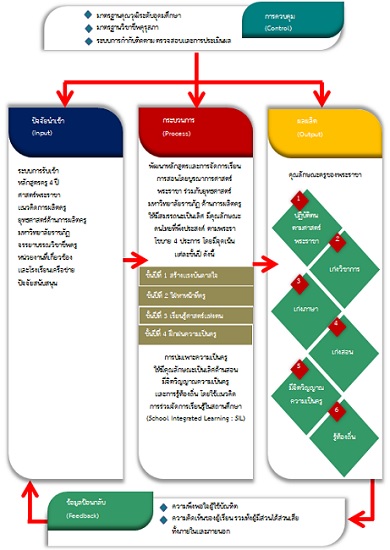DEVELOPMENT OF THE KING’S TEACHER-PREPARATION MODEL NAKHON RATCHASIMA RAJABHAT UNIVERSITY
DOI:
https://doi.org/10.14456/nrru-rdi.2022.66Keywords:
Model development, Model of teacher development, The King’s teachersAbstract
Adopting the King's Philosophy for integration and development of teacher capacity as requirements for users and locality was aimed at developing and evaluating the quality of the King’s teacher-preparation model at Nakhon Ratchasima Rajabhat University. In this study, twenty-two informants were recruited using the purposive sampling method. The research tools were derived from the drafted king’s teacher-preparation model, concordance assessment form, and suitability and feasibility assessment form with content validity between 0.6 to 1.0. The data collection process was accordingly performed through the utilization of the Zoom Cloud Meeting two times consecutively. Then the data was thoroughly analyzed with the content analysis method, followed by the quartile range and the mean calculation. Research results showed emphatic points according to the six empirical components of the quality of the king’s teachers. The comprehensive model for a practical purpose essentially leads this. The last items were clarity of definition and clarity of the experimental model. The feasibility of the model was ranked first, while the model’s language ability was ranked in the last place. Therefore, these findings altogether showed that adopting King's Philosophy for integrating and developing teachers’ capacity requires the readiness of all components. This will lead to the quality production of teachers efficiently.
References
Bardo, J. W., & Hartman, J. J. (1982). Urban Society : A Systematic Introduction. U.S.A. : F.E. Peacock.
Christ, T., Arya, P., & Chiu, M. M. (2022). Professor and institution characteristics: Relations to technology use and teacher preparation in literacy methods courses. Journal of Digital Learning in Teacher Education, 38(1), 33-53. https://doi.org/10.1080/21532974.22021.1998811
Cochran-Smith, M., & Reagan, E. M. (2022). Beyond “best practices”: Centering equity in teacher preparation evaluation. Education Policy Analysis Archives, 30(66), 1-39. https://doi.org/10.14507/epaa.30.7040
Herrera, L. J. P. (2022). Educational Linguistics. Washington, DC, USA : The George Washington University.
Hood, S. L., Dilworth, M. E., & Lindsay, C. A. (2022). Landscape of teacher preparation program evaluation policies and progress. National Academy of Education Committee on Evaluating and Improving Teacher Preparation Programs. National Academy of Education. Digital Object Identifier: 10.31094/2021/3/5
Jaritnom, Y. (2021). Development of Administration Model for Being a Professional Learning Community of Primary Shools under the Regional Education Office No. 11. Thesis, Doctor of Philosophy Program in Educational Administration and Development, Sakon Nakhon Rajabhat University, Sakon Nakhon. (In Thai)
Joyce, B., Weil, M., & Calhoun, E. (1995). Model of Teaching (8th ed.). London : Ally n and acon.
Kaewprom, C., Pollaharn, C., & Ruangsuwan, C. (2021). The Model of Teacher Development in Learning Management for 21st Century for Educational Opportunity Schools under Khon Kaen Primary Educational Service Area Office 3. Dhammathas Academic Journal, 21(4), 196-212. (In Thai)
Keeves, P. J. (1988). Educational Research Methodology, and Measurement : An Internation Handbook. Oxford, English : Pergamon and Press.
Khamanee, T. (2016). Teaching Science : Knowledge for effective learning process management (20th ed.). Bangkok : Chulalongkorn University Press. (In Thai)
Kratochvílová, J., Lojdová, K., & Vlčková, K. (2022). Pupil diversity in teacher preparation curriculum. Perspectives in Education, 40(2), 175-188. DOI: http://dx.doi.org/10.18820/2519593X/pie.v40.i2.13
Krea-ngam, W. (2017). Special Lecture on “ King Science ” is “ Science of the Land ”. Bangkok : King Prajadhipok's Institute. Bangkok : King Prajadhipok’s Institute. (In Thai)
Likert, R. (1967). The human organization: Its management and value. New York : McGraw-Hill.
Nopparak, S. (2018). King's Science to the Development of Management Science. Bangkok : Amarin Printing and Publishing. (In Thai)
Office of the Education Council Secretariat. (2017). National Educational Plan 2017-2036. Bangkok : Prikwan Graphic. (In Thai)
Office of the Education Council Secretariat. (2017). System and model of teacher production and research system of the Institute of Teacher Education that are suitable for Thai society and internationalization. Bangkok : Prikwan Graphic. (In Thai)
Panich, V. (2012). Ways to create learning for students in the 21st century. Bangkok : Sodsri-Saritwong Foundation. (In Thai)
Phramongkoldhammavitan, Phrakroosiridhammanidhesada, & Srathog, P. (2018). Professional teachers to professional learning. Verdian E-Journal, Silpakorn University, 11(1), 2486-2499. (In Thai)
Sanguannam, J. (2018). Theory and practice in educational institution (3rd ed.). Nonthaburi : Book Point. (In Thai)
Sedlack, R. G., & Stanley, J. (1992). Social research: Theory and methods. Allyn & Bacon.
Srisa-ard, B. (2017). Preliminary research (10th ed.). Bangkok : Suwiriyasan. (In Thai)
The Commissioner’ s Office 1, The Secretariat of The House of Representatives. (2017). Report of the Royal Council of Thailand's Reform Steering Committee, on the subject of the Royal National Reform Steering Committee. Bangkok : Publishing House Secretariat of the House of Representatives. (In Thai)
The Council of University Presidents of Rajabhat University. (2018). Rajabhat University Strategies for Local Development, 20 Years (2017-2036) (Update 11 October 2018). Bangkok : Ministry of Education. (In Thai)
Wannamanee, C. (2020). Manual for using the Student Desirable Characteristics Assessment Form for School Teachers in the Sub-District Quality School Project at the Secondary Level and the Pracharath School Project under the Office of Secondary Education Service Area 31. Lamphun : The Secondary Education Service Area Office, District 35. (In Thai)

Downloads
Published
How to Cite
Issue
Section
License

This work is licensed under a Creative Commons Attribution-NonCommercial-NoDerivatives 4.0 International License.




